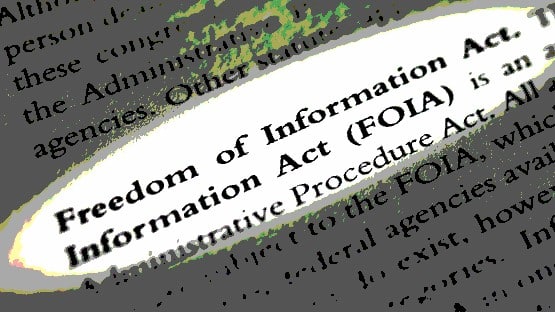
A judge will decide later this month if the Augusta County government will have to hand over the recording of a closed session held by the Board of Supervisors on March 20 to discuss the resignation of a former board member.
Judge Rupen R. Shah, on Tuesday, heard arguments in the case, which I brought as a pro se plaintiff, meaning, I represented myself, no lawyer, in Augusta County General District Court.
The county, on its side, had outside counsel, Rosalie Pemberton Fessier, an attorney with the Staunton-based law firm TimberlakeSmith.
Scott Seaton, the South River District representative on the Board of Supervisors, who made the recording of the closed session, testified in the case on behalf of the petition.
Shah said at the end of the hearing that he will hand down a ruling in the case on Thursday, Sept. 28, at 9 a.m.
Three weeks and change to get to a ruling – that may suggest the judge is thinking there is some complexity to what the two sides are arguing.
My case
The March 20 closed session of the Board of Supervisors, the public would come to learn months later, included a lengthy discussion of the resignation of Steven Morelli from the Board of Supervisors.
We were able to learn the subject matter of the closed session later due to what we’d have to call an inadvertent confirmation from Board of Supervisors chair Michael Shull in a July BOS meeting.
What we knew at the time, according to the official minutes of the March 20 meeting, is that the Board of Supervisors had called a closed session citing the economic development exemption, which is not being challenged here, and the personnel exemption under Virginia Code section 2.2-3711 (A)(1) – the minutes spelling out that the exemption would be “discussion, consideration or interviews of (a) prospective candidates for employment, or (b) assignment, appointment, promotion, performance, demotion, salaries, disciplining or resignation of specific employees.”
Of note here is that the motion to go into closed session was specific to the point of the discussion being about “specific employees.”
The code section cited actually allows, more broadly, closed-session discussions of “specific public officers, appointees, or employees of any public body,” and a 2003 advisory opinion from the Virginia Freedom of Information Advisory Council tells us that “(i)f a public body has the authority to censure, reprimand or otherwise discipline a fellow member of the elected body, then it may exercise this exemption to discuss the performance and subsequent discipline of the member.”
The motion made by the BOS to go into closed session, and which was approved by the board after the closed session, for some reason, did not cite “specific public officers,” just “specific employees.”
A member of the Board of Supervisors would not be considered an “employee,” but rather, a “public officer.”
A second issue here: Morelli had already resigned his office before the closed meeting.
Meaning, it would seem to stand to reason, that the board could no longer “censure, reprimand or otherwise discipline” Morelli in his capacity as a public officer, even if it had made it public that it was doing so in its resolution to go into closed session, because he was no longer a public officer.
The same 2003 FOI Council advisory opinion, which Whetzel cited in an email backing the county’s decision to deny our FOIA request, details why we have FOIA laws on the books in the first place.
“It is important to consider the public policy behind the creation of exemptions for certain public records and meetings generally. In no instance are the exemptions created purely for the convenience of the public body, or to allow a public body to keep somewhat embarrassing or sensitive issues out of the public light. Instead, each of the records and meetings exemptions was enacted to benefit the public in some way,” the 2003 advisory opinion informs us.
It is no doubt embarrassing to Augusta County that one of its members may have been accused of sexual harassment – and again, we know this to have been the subject of that March 20 discussion because the board’s chair, months later, said as much in a public setting.
Virginia’s FOIA law makes clear that whatever was said behind those closed doors on March 20, no matter how embarrassing it might be, however sensitive it might be, should have been said in a public forum.
This is what my legal fight on this boils down to.
The board seems to have used the personnel exemption under FOIA to provide cover for a discussion of a topic that could be seen as embarrassing for the county.
It did so sloppily – with a poorly-worded motion that wouldn’t have covered Morelli even if he hadn’t yet resigned, because the motion didn’t include “specific public officers.”
And even that point is rendered moot by the fact that Morelli wasn’t, at the time of the meeting, a “public officer,” because he had already resigned his seat, and at the time of the meeting was thus a private citizen.
A board of supervisors can’t meet behind closed doors to discuss the activities of former board members.
The Augusta County Board of Supervisors, back on March 20, did just that.
A recording of the meeting just so happens to exist.
That recording needs to be made public, is my contention.
The county’s case
On the first issue that I raised, on the resolution that was adopted by the Board of Supervisors to go into closed session, the county claims that the motion, while it did not include the reference to “specific public officers,” did include a sub-item (b) that referred to “Board of Supervisors,” which, apparently, from the reasoning offered by the county, should suffice to provide the necessary exemption under the state’s FOIA law.
To the county’s next point, regarding the status of Morelli, who had already resigned his seat ahead of the board’s closed session.
Here, the county cited a state code section, 24.2-226, which is titled “Election to fill vacancy,” to make the claim that though Morelli had resigned his seat before the meeting, his status was still in a sort of limbo.
From subsection (a) of 24.2-226: “The officer’s or officer-elect’s resignation shall not be revocable after the date stated by him for his resignation or after the forty-fifth day before the date set for the special election.”
The county’s contention: because Morelli could still revoke his resignation, which according to his statement of resignation was to take effect “immediately,” until midnight on March 20, he was still technically a public officer until midnight on March 20.
The county then raised a separate argument related to the legality of the recording itself, suggesting that the recording should not be made public under a state code section, 19.2-67, which is titled “Disclosure of information obtained by authorized means.”
Citing subsection (d) of that code section: “No wire, electronic or oral communication which is a privileged communication between the parties to the conversation which is intercepted in accordance with, or in violation of, the provisions of this chapter shall lose its privileged character, nor shall it be disclosed or used in any way.”
The county, on this point, appears to be trying to use this section of state code, which applies specifically to “investigative or law-enforcement officer(s),” and “police officer(s) of a county or city” – section 19.2 of the state code, on the whole, relates to “Criminal Procedure,” not meetings of public bodies – to make the claim that Seaton’s recording of the March 20 meeting should not be made public because it should be considered a “privileged communication” and because that communication was somehow “intercepted.”
Basically, the county is saying that Seaton did not have the right to record the closed session, and that as a result, the recording should not be made public.
Seaton, in his testimony, noted that he recorded multiple closed sessions of the Board of Supervisors to serve as his notes for what was said and done in the sessions, and cited that it is his right to do so under state code section 2.2-3712 (i) – “Minutes may be taken during closed meetings of a public body, but shall not be required. Such minutes shall not be subject to mandatory public disclosure.”
Splitting hairs
I’m arguing here that the Board of Supervisors either erred in the motion that it made to go into closed session by not specifically referencing that the discussion could involve “specific public officers,” or that the lack of a specific reference was a concerted effort by the board to hide the nature of what it was intending to do in the closed session.
The county, in its response on this point, again, is the claim that the motion, while it did not include the reference to “specific public officers,” did include a sub-item (b) that referred to “Board of Supervisors.”
My redirect there would be: are we supposed to just assume that the inclusion of the words “Board of Supervisors” is an assertion of an exemption allowing for a closed discussion of a matter involving a member of the Board of Supervisors? Because a member of the Board of Supervisors is not an “employee.”
There will be hairs to split on a final decision on this point.
Further, I argue that Morelli, the focus of the discussion, was already not a “public officer,” even if it is decided that the board could hold the closed session to discuss his resignation, because he had resigned “immediately.”
The county contends that Morelli could revoke his resignation by midnight on March 20.
More hair-splitting here.
And then, the county, in its defense, argues that the recording itself was not made legally because it involved “privileged communication,” and thus should be exempted from public disclosure.
This one seems to be a reach, because if the judge were to rule in favor of the county on this point, it would seem to stand to reason that all matters discussed in closed sessions of public bodies would have to be considered “privileged communication” and thus outside of the purview of FOIA, which would render FOIA null and void on the matter of closed sessions.
Why I’m fighting this
It’s odd to me that the county hired outside counsel to work on its behalf in this case, instead of using its in-house legal team, which the county taxpayers are already paying to provide legal services on the county’s behalf.
Fessier, a practicing trial attorney since 1995, brings an impressive resume to this kind of legal fight.
From a look at her bio on the TimberlakeSmith website, she’s the real deal.
“As the leader of TimberlakeSmith’s Local Government Law practice, Rosalie has been successfully representing and defending constitutional officers, localities, and other public bodies for over 20 years. She understands the unique and complex issues that face her local government clients and is able to effectively defend her clients in federal and state courts on cases that often garner close media attention,” her bio tells us, then adds, later, that she “has handled appeals to the U.S. Court of Appeals for the Fourth Circuit and the U.S. Supreme Court, as well as the Supreme Court of Virginia.”
At the other table in the courtroom today was me, a practicing journalist and editor since 1995 – no trial experience, nothing of a nature anything close.
The county, for some reason, feels the need to put a lawyer who argues cases before the U.S. Supreme Court against a run-of-the-mill local journalist, which feels a bit like using the H-bomb to deal with a pesky housefly.
I’ve been under the impression since the county denied my original FOIA request last month that there may have been something politically sensitive discussed in that March 20 closed session that county leaders don’t want people knowing about, but I have to admit, I wasn’t willing to go beyond hedging behind, maybe there was something, but maybe it’s something innocent, like wanting to protect the names of whistleblowers, though of course the names of whistleblowers could easily be redacted.
Anyway, I didn’t, until today, want to just assume anything.
The way the county came at me with the kitchen sink has me thinking differently in that respect now.










